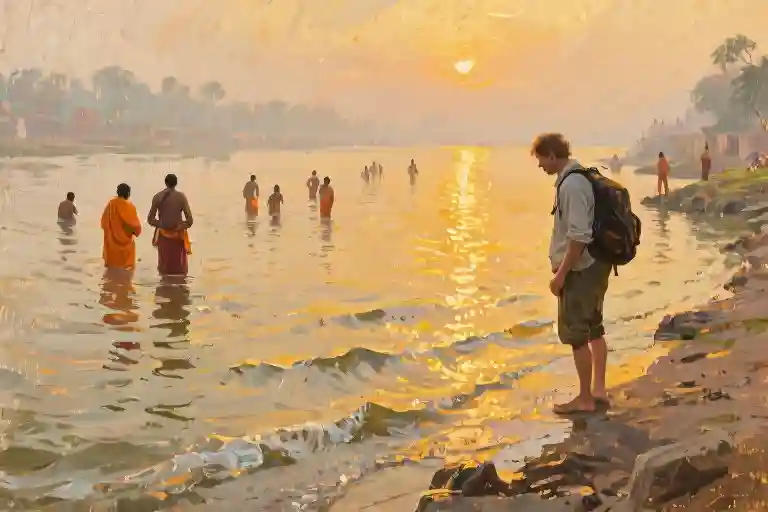Waist-deep in the Ganges River, the afternoon sun turning the water into liquid gold around my hips, I watched Robert take another deliberate drag from his cigarette. The smoke curled upward in the still air, a secular offering to the sacred river that had drawn pilgrims for millennia. He perched on a sun-warmed boulder, knees drawn up to his chest like a skeptical heron, his pale skin glowing against the terracotta hues of the riverbank.
‘You’re missing the point entirely,’ I called over the gentle lap of water. ‘It’s like buying front-row opera tickets just to people-watch in the lobby.’
Robert exhaled through his nose, the twin streams of smoke making him look momentarily dragon-like. We’d met three weeks earlier in a Delhi hostel dormitory, bonding over shared complaints about the mattress springs and a mutual appreciation for terrible Hindi pop music. Now we shared an adobe room in Rishikesh with a ceiling fan that clicked like a metronome, where Robert’s pack of Dunhills occupied the makeshift altar space between two brass Ganesh statues.
His current position – dry, smoking, and decidedly terrestrial – struck me as particularly absurd given our location. The Ganges here flowed clear and brisk from the Himalayas, not yet burdened with the weight of cities downstream. Women in neon saris beat laundry against smooth stones while upstream, saffron-robed sadhus submerged themselves with the solemnity of baptism. The air smelled of wet earth and marigolds, with occasional whiffs of Robert’s tobacco cutting through like a reality check.
‘Your feet at least,’ I negotiated, wading closer to shore. ‘Dip your toes. Then you can tell everyone back home you technically touched the Ganges without actually committing.’
Robert examined his cigarette as if it held answers, then sighed with the resignation of someone who knew he’d eventually relent. The boulder surrendered him reluctantly, his limbs unfolding in a series of hesitant movements. Watching him approach the water’s edge, I understood why our French roommate had nicknamed him ‘L’Homme Oiseau’ – the Bird Man. There was something distinctly avian about his careful steps, the way his head darted side to side as if expecting predators.
When the first wavelet licked his sandals, he froze like a man encountering an electric fence. ‘There,’ he announced, as though completing a dare.
‘That’s not even proper contact,’ I laughed. ‘The river’s not contagious, you know.’
His subsequent tiptoeing would have done a ballet dancer proud, each centimeter of progress marked by exaggerated facial expressions. At ankle-depth, he paused to ash his cigarette with the concentration of a bomb technician. The sight – a grown man simultaneously maintaining a nicotine habit while gingerly interacting with one of Earth’s most sacred waterways – perfectly encapsulated the beautiful absurdity of travel. We journey halfway around the world seeking transformation, then cling to our routines like life preservers.
The river accepted Robert gradually. First his pale ankles disappeared, then his shins, the waterline creeping upward as he leaned forward in increments. His cigarette burned down unnoticed as the Ganges worked its quiet magic, until finally, miraculously, I saw his fingertips break the surface in an awkward mimicry of the pilgrims’ gestures upstream. The sacred and the mundane had found their compromise.
At Least Dip Your Toes In
The cigarette ash trembled at its tip as Robert took another drag, his bare feet planted stubbornly on the sun-warmed boulder. From my waist-deep position in the Ganges, I could see the exact moment his exhaled smoke merged with the morning mist rising off the holy waters—a perfect visual metaphor for our cultural standoff.
“Come on, just up to your knees,” I bargained, shifting my weight against the current. The riverbed stones rolled slightly under my toes, polished smooth by centuries of pilgrims. “You flew halfway around the world to smoke beside it instead of in it?”
Robert scratched his pale shoulder where the backpack straps had left angry red lines. His entire body seemed to recoil from the water’s edge, though he’d grudgingly moved within splashing distance. “I don’t see you drinking it,” he muttered, flicking ash toward the shallows where a marigold garland floated by.
This was the third cigarette since we’d arrived at Triveni Ghat, where the Ganges supposedly converged with two mythical rivers. I’d learned that backpacker stubbornness manifests differently—some refused vaccinations, others haggled over ten-rupee chai. Robert’s resistance took the form of this slowly burning Marlboro, his personal forcefield against cultural immersion.
“Not drinking,” I corrected, scooping a handful of water that glittered with suspended particles. “But swimming in liquid history? Absolutely.” The analogy struck me as I said it—entering the Ganges felt like stepping into an illuminated manuscript, every ripple containing centuries of prayers. Missing that experience seemed as absurd as touring the Sistine Chapel with your eyes squeezed shut to avoid Michelangelo’s ceiling.
A group of saffron-robed sadhus passed behind Robert, their chants momentarily drowning out his grumbling. Their ease in the water highlighted his stiffness—where they flowed like tributaries, he resembled a poorly assembled folding chair. Still, when his next exhale came out shaky, I knew the battle was tipping.
“Fine,” he conceded, stubbing out the cigarette on a rock (a minor sacrilege I chose to ignore). “But if some water snake bites my—”
“They’re considered sacred too,” I grinned as he yelped at the first toe-dip. The river had that effect—shocking you awake with its icy grip before the spiritual significance could register. Robert’s comically slow advance—ankles, then shins, knees locking like rusty hinges—mirrored every traveler’s first tentative steps into the unknown.
The Chill of the Sacred
Robert’s toes curled like sea anemones recoiling from a predator as the Ganges first kissed his skin. That first contact—hesitant, almost apologetic—sent a visible shudder through his narrow frame. The cigarette between his fingers trembled, its ash threatening to join the river’s flow.
“It’s like sticking your foot in a freezer filled with knives,” he muttered, though the water barely covered his ankles. Around us, saffron-robed sadhus submerged themselves with the ease of returning salmon, their matted hair fanning out like riverweed. The contrast couldn’t have been sharper—their purposeful immersion versus Robert’s pained tiptoeing, as if navigating an invisible minefield of discomfort.
The riverbed surprised me every time. Not the expected silt between one’s toes, but polished stones worn smooth by centuries of pilgrim feet. They shifted unpredictably beneath my soles, these ancient marbles that had witnessed generations of bathers. When Robert finally committed to standing calf-deep, his knees locked in a parody of military attention, I watched his face undergo a slow transformation—from resistance to reluctant acceptance, then to something resembling awe.
A group of local women downstream provided accidental theater. Their saris blossomed like water lilies as they dipped beneath the surface, emerging with offerings of flowers and milk. Robert’s awkward splashing seemed almost sacrilegious by comparison, yet there was beauty in his clumsy participation. The river accepted us all—devotees and doubters alike—with equal indifference.
What struck me most wasn’t the cold, though that first plunge still haunted my nerve endings. It was the way the water carried traces of everything it touched—woodsmoke from morning pujas, the metallic tang of temple bells, even the faintest whisper of funeral pyres from upstream. Robert, now patting the surface as one might test a hot stove, remained oblivious to this liquid tapestry. His focus stayed stubbornly physical—the goosebumps rising on his arms, the way his shorts clung uncomfortably to his thighs.
We create our own Ganges, I realized. For some, a sacred artery connecting earth and heaven. For others, just another freezing river making their travel buddy look ridiculous. The water didn’t care either way—it kept flowing past our temporary bodies, patient as only something eternal can be.
The Hollow Traveler and the Steady River
Robert’s fingers trembled as he flicked cigarette ashes toward the Ganges, his entire body radiating the tension of a man walking a tightrope over sacred ground. There was something profoundly vulnerable about watching this grown man – all sharp angles and nervous energy – tiptoe into waters that local children were diving into with abandon just upstream. His movements reminded me of those old cartoons where characters would walk across hot sand, lifting each foot with exaggerated care.
That image of him ‘rattling around inside a cavernous shell of himself’ kept returning to me as I watched his progress. It wasn’t just physical awkwardness; it was as if his entire being resisted occupying space in this unfamiliar world. His shoulders hunched defensively when Hindu pilgrims walked past, his voice dropped to a whisper near temples, even his smoking seemed more frantic here than it had been in Delhi’s backpacker hostels. Every gesture broadcasted the same message: I don’t belong.
Yet this self-protective shrinking made him paradoxically more noticeable. While seasoned travelers develop what I call ‘cultural camouflage’ – that ability to subtly adjust posture, volume, even walking pace to blend in – Robert stood out precisely because of his resistance to adaptation. His body language screamed ‘tourist’ in a place where most visitors at least attempted some semblance of reverence.
We’d met three weeks earlier in a Varanasi guesthouse, bonding over shared complaints about bedbugs and the universal backpacker currency of cigarette trading. These transient friendships have their own peculiar intimacy; you share mosquito nets and stomach medications with near-strangers, discussing childhood traumas between bites of questionable street food. There’s an unspoken understanding that these connections exist outside normal social rules – intense but temporary, deep yet disposable.
Watching Robert’s glacial progress into the river, I realized these travel friendships serve as psychological airlocks. They allow us to transition between cultures while maintaining some anchor to our familiar selves. That morning, I’d become Robert’s cultural interpreter without realizing it – explaining why the sadhus wore orange, what the floating offerings meant, when to remove our shoes. In return, his resistance grounded me, reminding me how bizarre this all must seem to someone fresh off the plane from Manchester.
A group of local teenagers laughed as they passed our stretch of riverbank, their amusement clearly directed at Robert’s comically cautious approach to the water. He froze mid-step, one pale foot hovering above the surface like a heron unsure of its landing. For a terrible moment, I thought he might retreat entirely. Then something unexpected happened – he turned toward the boys, raised his half-smoked cigarette in salute, and deliberately sat down in the river with all his clothes on.
The water only reached his waist in this position, but the symbolic surrender was complete. As his cigarette extinguished with a hiss, Robert’s entire posture changed. The defensive hunch relaxed. He stopped glancing sideways at every splash. When one of the laughing boys shouted something in Hindi, Robert actually smiled – not the tight, nervous expression I’d grown accustomed to, but something approaching ease.
Maybe that’s the secret these sacred places understand about human nature. We enter them armored in skepticism and self-consciousness, our modern minds rattling in ancient spaces meant for different kinds of knowing. The Ganges doesn’t care if you believe in its purifying powers any more than the Sistine Chapel ceiling requires your theological agreement. These places work their magic not through sudden conversions, but through the slow saturation of being present – water seeping into fabric, light filtering through dust motes, until one day you realize your resistance has become participation.
Robert stayed in that seated position longer than I expected, watching the river carry away the remains of his cigarette. When he finally stood, his clothes dripping and heavy, he didn’t immediately reach for a fresh smoke. Instead, he looked at me with an expression I couldn’t quite read and said the last thing I anticipated: ‘Do they sell proper chai around here?’
Ripples in the Sacred Current
The river swallowed Robert’s hesitation in concentric circles as his palms finally broke the surface tension. His fingers hovered there, suspended between devotion and disbelief, cigarette still clamped between his teeth like some secular talisman against the holy water. The Ganges absorbed his tentative touch without ceremony – this was a river that had welcomed millions of trembling first encounters before ours.
From my waist-deep vantage, I watched the smoke from his neglected cigarette curl upward to meet the morning incense drifting from the ghats. Two kinds of sacred vapor mingling above our heads. Robert’s reflection in the water shivered with each ripple, his edges blurring into the reflections of passing sadhus carrying brass pots. For that suspended moment, all of us – the reluctant backpacker, the devout pilgrims, the river itself – existed in the same liquid reality.
Then he jerked his hand back as if shocked. ‘Cold?’ I asked, already knowing the answer. He shook his head, but the way he cradled his dripping hand against his chest told another story. Not the physical chill, but the visceral shock of contact with something ancient and alive. The Ganges does that – even when you’re just patting its surface like a suspicious cat, it transmits something older than religion through your fingertips.
Behind us, a shirtless priest began chanting while pouring milk offerings into the current. Robert’s eyes tracked the white stream dissolving into brown water, his expression caught between anthropological interest and personal unease. I recognized that look – it’s what happens when travel stops being about Instagram backdrops and starts being about the uncomfortable privilege of standing waist-deep in someone else’s truth.
His cigarette chose that moment to surrender to the river, the ember hissing out in a tiny protest. We both watched it float away toward Varanasi, toward the burning ghats and the cycle it might complete. Neither of us mentioned the irony.
When Robert finally spoke, his voice had lost its usual sarcastic edge. ‘Do you actually feel different?’ he asked, studying his pruned fingertips. The question hung between us like the humid air. I opened my mouth to deliver some profound backpacker wisdom, then closed it again. The truth was, I didn’t know. The Ganges reveals its meanings slowly, in the quiet hours after you’ve left its waters, in dreams that smell of wet stones and marigolds.
So we stood there, two temporary specks in an eternal current, our reflections dissolving and reforming with each ripple. The river didn’t care about our existential questions – it just kept flowing south, heavy with the weight of a thousand dipping hands, a million whispered prayers, and one backpacker’s half-smoked cigarette.





